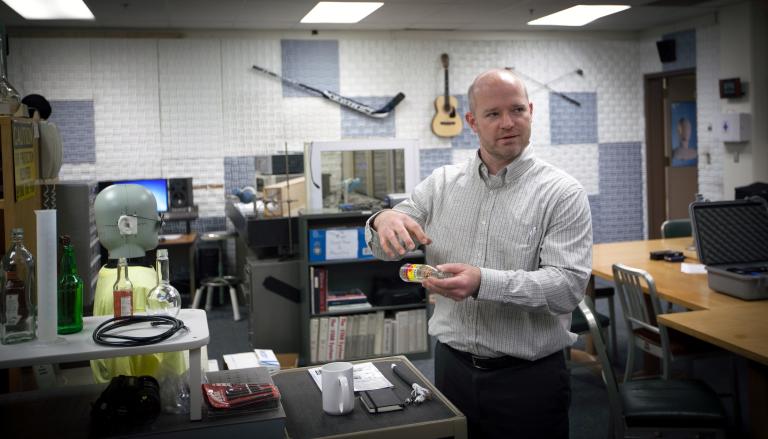
“You get the opportunity to learn from what you did and examine what could be changed to get a different result. A lab is an ideal place to learn those things.”
A Physics lab might not be the most obvious setting for where students learn from curriculum infused with entrepreneurial thinking, but thanks to a topical grant from the Kern Entrepreneurial Engineering Network (KEEN), that’s exactly what students in Kettering University’s Physics 1 lab have been experiencing.
“When we proposed the idea to KEEN in 2013, we were looking to address entrepreneurial mindset elements related to learning through failure,” said Dr. Daniel Ludwigsen, associate professor of Physics. “If you fail at something, you can learn from it and keep going. It’s a different concept than if you get an answer wrong and you’re just wrong. You get the opportunity to learn from what you did and examine what could be changed to get a different result. A lab is an ideal place to learn those things.”
The lab curriculum was revamped and instead of a traditional setting, it treats students as new hires in a consulting firm called ‘Mechanics, Inc.’ Early in the course, students are trained with skills needed to provide consulting services to companies. Then, they are assigned two multi-week challenges from a client.
“The training activities are not just technical,” Ludwigsen said. “Students also have to be mindful of how they communicate their results effectively. Throughout the term, we build to the point where they’re eventually able to write a full lab report.”
The curriculum for the course was fully deployed during the summer 2014 term after teaching a pilot course. It has been taught by multiple faculty members in the Department of Physics.
“The fact that multiple people have taught the course now allows us to constantly cycle instructor feedback back into the course,” Ludwigsen said. “Faculty have also tailored the material to their own teaching styles and to fit the community of students in the classroom. The role of faculty in this course is different than a traditional lab. They’re not just going through step-by-step training. The faculty role is to walk around, ask questions to find out what students know instead of students asking questions and really look at activities like a coach would -- how can we improve procedures, advise and guide?”
The new curriculum has also caused some different roles to emerge for the students.
“The students have reacted to the paradigm shift,” Ludwigsen said. “At first, they want detailed instructions to follow. But they gradually begin to understand that the freedom to think about what they’re doing is important, that those ambiguous instructions allow them to explore and develop their own creativity and problem-solving abilities.”
Ludwigsen will be presenting the concept for the curriculum and results at the American Society for Engineering Education Conference in Seattle in June.
“The curriculum prompts students to think about concepts in ways they hadn’t before,” Ludwigsen said. “That is one of the core skills that engineers need.”